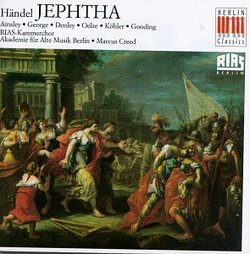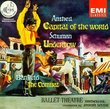| All Artists: George Frideric Handel, Akademie für Alte Musik Berlin, Marcus Creed, John Mark Ainsley, Michael George, Catherine Denley, Christine Oelze, Axel Köhler, Julia Gooding, RIAS-Kammerchor Title: Handel - Jephtha / Ainsley, George, Denley, Oelze, K�hler, Gooding, RIAS-Kammerchor, Creed Members Wishing: 0 Total Copies: 0 Label: Berlin Classics Release Date: 6/28/1994 Genres: Special Interest, Classical Styles: Karaoke, Opera & Classical Vocal, Historical Periods, Baroque (c.1600-1750) Number of Discs: 3 SwapaCD Credits: 3 UPC: 782124105723 |
Search - George Frideric Handel, Akademie für Alte Musik Berlin, Marcus Creed :: Handel - Jephtha / Ainsley, George, Denley, Oelze, K�hler, Gooding, RIAS-Kammerchor, Creed
CD DetailsSimilar CDs |
CD ReviewsNEMESIS NEGATED DAVID BRYSON | Glossop Derbyshire England | 07/19/2004 (5 out of 5 stars) "Whatever economic dark night the classical music industry is currently going through, one result has been an absolutely superb crop of early music records. England has particularly distinguished itself, but here is a set of an English language masterpiece from Berlin that stands comparison with the best. The version of Handel's great Jephtha that I have lived with for many years is by Marriner and the Academy of St Martin's. I'm not seeing it in the current catalogues, but what I have observed is two other versions receiving highly favourable notices. Anyone with world enough and time may want to obtain or at least hear these. For now I only wish to signal that there is another serious contender in the lists. The recorded sound on this set is one I'm particularly comfortable with. That may be both a good and a not-so-good thing in one sense. The biblical story of Jephtha (Judges XI) is not a comfortable one in the least, and I have not so far got from this account quite the acute sense of mounting tension, panic and despair that Marriner conveys. In the scripture Jephtha attempts to make a deal of the most appalling insolence and presumptuousness with the frightful Jehovah of the old testament. Handel's librettist, the Rev Morell, perhaps nervous at even handling this incident, tries in various ways to make placatory gestures towards the Almighty, but I remain convinced that Handel, who knew his scripture, basically kept the biblical version in mind. Faust himself hardly made a more dreadful bargain, but the story also recalls the sacrifice of Iphigenia before the attack on Troy. Morell, a Greek scholar himself, names Jephtha's daughter Iphis, and I suppose he had some right to play his own variation on the name as the most famous version of that story, in book I of Lucretius, substitutes Iphigenia's sister Iphianassa for no reason that I ever knew considering both names fit the metre. It is a kind of biblical story that Handel was uniquely suited to. Jephtha is his last oratorio and he was struggling with advancing blindness during its composition. Music-lovers familiar with Messiah but not with Handel's other oratorios would be mistaken in my view to think that a certain unevenness in Messiah, the result of tearing haste, is characteristic. Jephtha, like Samson or Theodora, is thoroughly consistent in quality and workmanship. It contains some famous high spots around the mark of the end of act II and the start of act III. Jephtha's accompagnato `Deeper and deeper still' and the following chorus `How dark o Lord' are well known or at least get a lot of conventional mention, as does the celestial aria `Waft her angels', very likely because the more traditional commentators did not know the other numbers and indeed possibly not even these. The story develops powerfully, and Morell deserves some of the credit for that. He dilutes the crassness and hubris of Jephtha's behaviour, but Handel takes advantage of this to give light and shade to the action while focussing strongly on the horrific and terrifying mess that Jephtha has got himself into. It did not do to send London audiences home gloomy. Handel had probably fallen into that trap with his previous oratorio, his beloved Theodora, a gripping and convoluted tale of a priggish stand on principle, brutal retaliation, desperate and ingenious attempts to retrieve the situation, the worst possible outcome and a prevalent sense of futility. Theodora had been a box-office disaster, Morell had been the librettist of that too, and he provided a thoroughly 18th-century happy ending for Jephtha, involving not death but a commuted sentence of virginity for Iphis. At this stage my sense of dramatic action switches off, as I believe Handel's did. It is all very successfully done in my opinion, but a stylised epilogue rather than a real part of the action. Indeed it comes as something of a relief. The action proper has real development and concentration and the earlier numbers are a jewel-box. I believe that Handel has also given some measure of immortality to one Habermann by filching material from his contemporary masses for the choruses, providing the catalyst for that unique choral writing, unequalled in the entire history of the art. With today's early music groups one becomes repetitious in saying that they perform more or less faultlessly. I don't know the nationality of the members of the chorus, but their English elocution is magnificent, and while it was fairly obvious that the Storge is not English I reflected that her pronunciation was a great deal better than the composer's from all accounts. The liner-note tells us nothing at all about the performers, and even in the era of search-engines I find that a little bit of a hardship. The booklet is in English only, so I'm all right, but what is quite startlingly good is the essay by Donald Teeters, a model of intelligence, independent thought and good sense." Top-ranking choice for Handel's oratorio swansong Nicholas A. Deutsch | New York, NY USA | 01/28/2007 (5 out of 5 stars) "Handel's last four English oratorios are among his finest works: SOLOMON with its spacious pageantry, SUSANNA's curious yet effective hybrid of moral drama and English "village opera," the profoundly personal spiritual drama of THEODORA, and the intimate family tragedy - opening out onto deep philosophical vistas - of JEPHTHA... each one with its distinct atmosphere. Of these, JEPHTHA may be the most flawed in some of its details (notably the controversial ending), but each time one returns to it its imperfections matter less and less. It is one of the essential Handel works, and one of his most moving.
This 1994 studio recording ranks at the top of my personal list, along with John Eliot Gardiner's live version on Philips. Superbly played, sung and conducted, with a well-nigh ideal cast of soloists, it can be recommended without reservations. One consumer tip, however: it has been reissued on Brilliant Classics (with complete English text and program note) at a considerably lower price - worth seeking out." |



